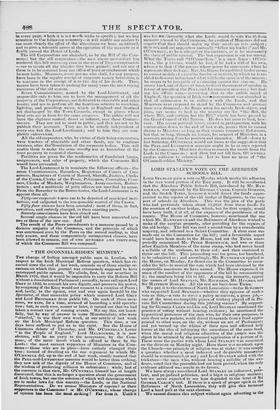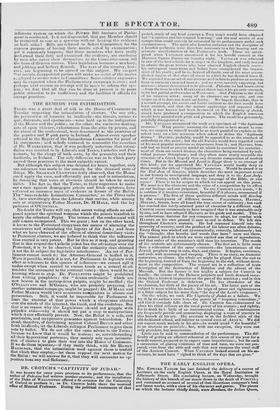LORD STANLEY'S VOTE ON THE ABERDEEN SCHOOLS BILL.
LORD STANLEY gave a vote on Monday which marks his adhesion to the very worst portion of the Tory party. It will be recollected that the Aberdeeti Public Schools Bill, introduced by Mr. BAN- NERMAN, was opposed by Sir GEORGE CLERK, Captain GORDON, and the Scotch Tories, because it would divert the funds appro-
priated to the repairs of the old bridge of Balgounie, to the sup- port of schools in Aberdeen. This was the plea of the party who had previously taken about 15,0001. from these funds for the erection of another bridge, which, but for that supply, would have been built, if at all, at the expense of the gentlemen of the county. The House of Commons, however, sanctioned the use which Mr. BANNERMAN and the Reformers of Aberdeen wished to make of the surplus property, after providing for the repairs of the old bridge. The bill was read a second time by a considerable majority, and referred to a Select Committee. A clear case was
made out in the Committee for the bill; and a favourable report would have been made to the House, had not the Tories unex- pectedly summoned Mr. PETER BORTHWICK, and two or three other English Members of the same stamp, who had never heard a syllable of the evidence, to their aid ; and thus contrived to throw out the bill. This proceeding was too gross, too barefaced, to be submitted to; and accordingly, Mr. BANNERMAN applied to the House, on Monday, for directions to the Committee to recon- sider the bill—to rescind the vote which had been obtained by the respectable assistance we have named. The blouse expressed its sense of the conduct of the opponents of the bill by recommitting it ; tile numbers being 158 to 107. Among the minority, appear the names of Lord STANLEY, Mr. RICHARDS, Mr. HUGHES, afid Sir MeTTHEw RIDLEY. All the rest are back-bone Tories.
We put it to the electors of North Lancashire—to the Reformers wino supported Lord STANLEY—whether they approve of such a vote as this,—a vote to cover a paltry manceuvre, a gross job,— one of the most contemptible pieces of trickery played off in Pri- vate Bill Committees during this jobbing session ? By support- ing Sir GEORGE CLERK and his set, Lord STANLEY sanctioned the practice of voting without hearing evidence; he sanctioned the hypocritical pretences of the men who, for their own purposes, to save their own pockets, could divert thousands from a fund appro- priated to other uses, on the sly, without an act of Parliament; and yet turned up the whites of their eyes and affected holy horror at the idea of infringing the sacredness of the same fund, when the mot-al and religious education of the eeople was the object to be attained by the proposed application of a portion of It. These were the parties with whom Lord STANLEY was associated on the division on Monday night. Here there was no attack .upon the Church—no principle of religion was at stake: it was simply a question whether a most indecent and despicable manceuvre should be counteracted, or not; and Lord STANLEY sided with the tricksters—the men who, without hearing a syllable of the evt- deuce, voted that the preamble had not been proved, when the only
evidence adduced was ample in its favour. •
We have always considered Lord STANLEY an indiscreet, petu- lant, and prejudiced politician, and a bigot in religious matters.; bnt we never expected to see Inin degraded to the level of Sir GEORGE CLERK'S tool. If there is a spark of proper spirit in the Reformers of North Lancashire, they will give this turncoat Lord a hard pull at the next election.
We cannot dismiss this subject without again adverting to the
infamous systetn on which the Ptivate Bill business of Parlia- ment is conducted. Is it not disgraceful, that any Member should be permitted to vote on a question without hearing the evidence on both sides ? Bills are referred to Select Committees fir the express purpose of having their merits sifted by examination ; yet it commonly happens, that those members who have really performed their duty and examined the evidence, are overborne by men who never show themselves in the Committee-room till the hour of division arrives. Thus legislation becomes a mockery, and jobbing and bribery flourish. The e)es of the country, how- ever, are beginning to be opened on this subject. We suspect *bat certain disappointed parties will make no secret of the modes e.iployed to secure votes in Committees. Some salutary exposures may be expected when the Parliamentary campaign is over ; and perhaps next session an attempt will he made to reform the sys- tem : we fear that all that can be done at present is to point public attention to its inefficiency and the facilities it affords fir corrupt practices.



























 Previous page
Previous page